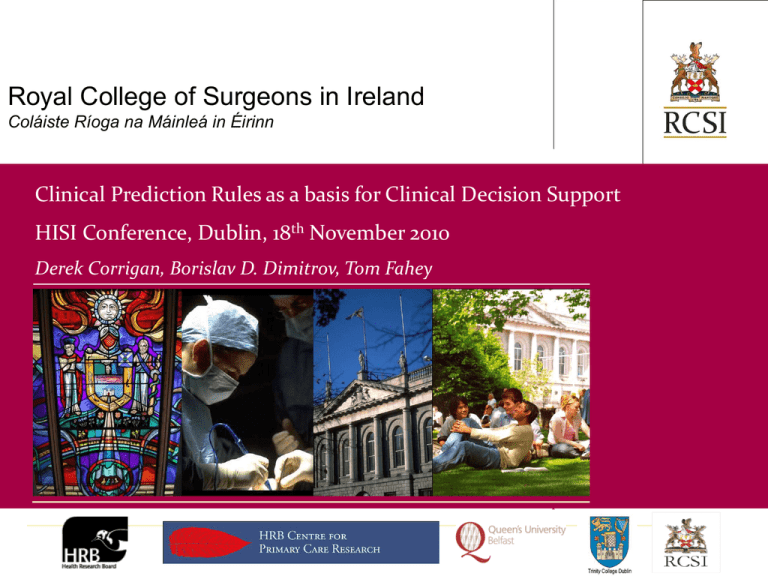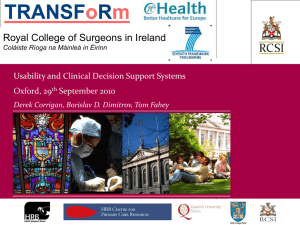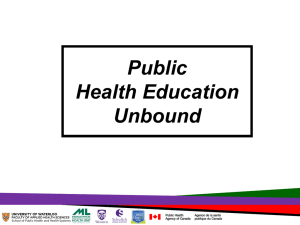Royal College of Surgeons in Ireland Coláiste Ríoga na Máinleá in
advertisement

Royal College of Surgeons in Ireland Coláiste Ríoga na Máinleá in Éirinn Clinical Prediction Rules as a basis for Clinical Decision Support HISI Conference, Dublin, 18th November 2010 Derek Corrigan, Borislav D. Dimitrov, Tom Fahey PHS / Department of General Practice Overview • Brief overview of work HRB Centre for Primary Care Research • What is a Clinical Prediction Rule (CPR)? • What is a Clinical Decision Support System (CDSS)? • What role can Clinical Predication Rules play in a CDSS? • What form might a state of the art CPR based system look like? • What are the challenges to achieving this state of the art? PHS / Department of General Practice HRB Centre for Primary Care Research • On-Going Work – Clinical and health informatics staff working on compiling a definitive register of Clinical Prediction Rules (CPRs) for use in Primary Care based on systematic reviews of clinical literature • Ultimate Aim – e-Register – Provide an electronic register of CPRs suitable for Primary Care – Fully searchable – Fully documented PHS / Department of General Practice Definitions – Clinical Prediction Rule • Clinical Prediction Rule – Formalised clinical tools that quantify the contribution of • Patient History – e.g. History of high blood pressure • Physical Examination – e.g. Fever • Diagnostic Tests – e.g. Blood count tests – Stratify patients diagnosis • Probability of having target disorder based on scoring system – Outcome can be in terms of diagnosis, prognosis, referral or treatment PHS / Department of General Practice An Example – CRB 65 Rule - Pneumonia Confusion, Respiratory Rate >= 30/min, BP : SBP<90 mm Hg or DSP <= 60 mm Hg, Age >= 65 years Rule Criteria CRB Score Risk Decision 0 1 OR 2 3 OR 4 Mortality Low Mortality Intermediate Mortality High Likely Home Treatment Likely Hospital referral and assessment Urgent Hospital PHS / Department of General Practice PHS / Department of General Practice Definitions - Clinical Decision Support System • Clinical decision support system (CDSS) – I.T. based systems that are designed to improve clinical decision making by suggesting possible clinical actions/interventions based on an underlying clinical evidence base • CDSS Types – Diagnostic systems – diagnose appendicitis – Reminder systems – generate patient letters – Disease management systems – diabetes management – Drug dosing/prescribing – insulin, warfarin PHS / Department of General Practice CDSS – The Electronic Patient Record • The Electronic Patient Record (EPR) has long been viewed as a holy grail in Health Informatics • Some conflicting debate about what the quantifiable benefits of the EPR are, if any • Tend to view EPR in the context of a single patient • Doesn’t always take into account the potential when EPRs are looked at collectively from a research perspective – this may be their real power! PHS / Department of General Practice CDSS – Maintaining the Evidence Base • Huge potential evidence base in EHRs in primary care e.g. General Practice Research Database in UK (GPRD) • Create clinical trials/ epidemiological studies from primary care data • May be used to amend an existing CPR i.e. the inclusion of additional symptoms/signs identified by data analysis as potential diagnostic cues • May be used to create new CPR’s based on new diagnostic cue combinations • Evidence base becomes “self-learning” and adds or refines the list of CPR’s used as the evidence base PHS / Department of General Practice Implementation of Research Evidence PHS / Department of General Practice The TRANSFoRm Project • “Translational Research and Patient Safety in Europe” • 5 Year EU funded research project – just started • 17 Participant bodies including the HRB Centre • Leading Work Package 4 – “Decision Rules and Evidence” • Bridge clinical research and primary care practice – will involve validation in Irish GP sites PHS / Department of General Practice TRANSFoRm Work Packages PHS / Department of General Practice The TRANSFoRm Project PHS / Department of General Practice TRANSFoRm Services 1 CPR Repository Clinical Prediction Rules Service 2 Distributed GP EHRs With CDSS 3 Research Study Designer Study Criteria Design CP Rules Manager CP Classifier 5 CPR Data Mining and Analysis CPR Analysis & Extraction Tool Find Eligible Patient 4 Research Study Management Recruit Eligible Patient Study Data Management PHS / Department of General Practice Define Study Eligibility Criteria – Electronic Primary Care Research Network (Epcrn) PHS / Department of General Practice Gather Study Data - Case Report Forms ePCRN PHS / Department of General Practice How can this improve Patient Safety? • Diagnostic error is the major threat to patient safety in the context of the primary care setting • TRANSFoRm uses CPRs to broaden the evidence base considered by GPs to support inclusion / exclusion of diagnostic hypotheses for any particular case – not just previous patient history • By implication, decreasing the possibility of diagnostic error will improve patient safety • Bridges the gap between implementing evidence based care research in the primary care setting PHS / Department of General Practice TRANSFoRm Challenges The EPR – Still a huge amount of work to be done just to create usable EPRs System Interoperability – consistent representation of clinical data using technologies – Health Level 7 (HL7), OpenEHR – pool and share clinical data by allowing systems to ‘talk together’ Semantic Interoperability – being able to interpret clinical concepts contained within data in a consistent way – Clinical Coding Terminologies such as SNOMED-CT, ICPC, ICD PHS / Department of General Practice In Summary • CPRs have huge potential as a form of evidence in CDSS • A number of technical challenges exist – system/semantic interoperability • Future directions - develop the Electronic Patient Record and incorporate research tools to generate and update the evidence base – “self-learning” PHS / Department of General Practice Thank You Discuss! PHS / Department of General Practice








